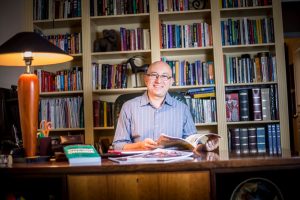
South Tempe resident Dr. Flavio Marsiglia has joined the ranks of the most pre-eminent college members at U.S. colleges, honored as a Regents’ Professor for the 2014-2015 academic year.
A native of Uruguay, Marsiglia, who teaches social work at Arizona State University, first came to this country during the mid-1980s as part of an exchange program for social workers.
Now, 30-plus years later, he has established a worldwide reputation for his substance-abuse prevention programs among middle-school-age youth, including those in the Kyrene School District.
According to the highly regarded members of a nationwide selection panel that reviewed the accomplishments of hundreds of potential recipients, Marsiglia’s initiatives have led to a measurable decline in drug use and high-risk behavior among youth in Phoenix and in more than 30 other states and foreign countries.
What sets Marsiglia’s approach apart is that it’s culturally grounded to meet kids where they live—to connect with them by taking into account the social, family and economic environments that affect them directly.
“Our concern was making prevention programs for kids (that are) relevant to them,” Marsiglia told Wrangler News.
“A few years ago we used to believe that one program would be the answer. But kids need to recognize themselves in the intervention, to say, ‘It’s about me.’”
In Mexico, for example, students couldn’t connect with videos that featured non-Mexican children and that had voice-overs in Spanish.
Marsiglia was able to get funding for a new set of videos and worked alongside the University of Guadalajara to produce them. Local Mexican students wrote the scripts, acted in the videos and did the camera work. “We are testing now to see if the new videos got better results,” Marsiglia said.
In Spain, his social work students decided they wanted to work with the Gypsy population to help children resist substance abuse. “We’re ready to start that project in August. It’s an underserved, misunderstood population not only in Spain, but across the continent,” Marsiglia said. “We hope we can do something to serve them.”
In China, local officials are seeing a spike in drug abuse among students whose parents left rural areas and migrated to cities in search of jobs. Marsiglia sees a similarity to the struggles of Mexican migrants. Migrant parents, whether Chinese or Mexican, tend to have a more traditional outlook. Suddenly, they’re faced with kids who are talking back to them and who have often assumed the adult role in the family. It’s the kids who have adapted to the new surroundings and families need new strategies to avoid the pitfalls of drug abuse.
Marsiglia’s program, dubbed “Keepin’ It R.E.A.L.,” teaches kids strategies about how to resist drugs. The strategies he presents weren’t dreamed up in an ivory tower either. Marsiglia said his team, part of an ASU department entrusted with the project on the basis of a federal grant, interviewed students who were not using drugs and asked them how they avoided becoming ensnared in substance abuse.
“We said to them: ‘We are sure at one point or another you got an offer. What did you do?’ Then they told us. We analyzed all the stories to see the most common strategies being used,” Marsiglia said.
Scare tactics and preaching might make parents feel good, but they don’t work, Marsiglia said.
So what does? Turns out that’s how Keepin’ It R.E.A.L. landed its name: Refuse, Explain, Avoid and Leave. Each of the four strategies is accompanied by a video. There’s also a teacher’s manual, student workbook and a parenting component.
“We emphasize family functioning, and a big part of that is parent-child communication,” Marsiglia said. He’s concerned that many children spend way too much time alone or fixated on their computers and cell phones.
Keeping children involved with positive activities and interacting with people is important, he said. And it’s also a good idea for kids to have other adults involved in their lives: grandparents, aunts and uncles and others who serve as role models.
“Talk to your child,” Marsiglia emphasized. Too many parents don’t establish good communication with their children early on, then expect to have deep conversations about drugs, alcohol and sex when a child turns 12.
“Always tell the child, ‘All topics are good topics. You can always talk to me. Anything that happens to you, I care about. Any ideas any thoughts, you can share them with me. I’m here to listen to you,’” Marsiglia said.
The “Keepin’ It R.E.A.L.” 10-week program has been used in Arizona’s American Indian population as well as in Spain, Mexico and Uruguay, from which he just returned. Marsiglia will be heading to China at the end of the month to discuss the program with officials there who say they are eager to find an effective means to deal with a growing substance abuse problem in that country.
Saying he did not expect the kind of recognition that goes along with the Regents Professor prize, Marsiglia said he is humbled and grateful to have been named a Regents Professor.
“I was very surprised that I have been selected at my age and this stage in my career,” Marsiglia said.
“I don’t see it as my award — it’s an award that is given to my wonderful colleagues, my students and, more than anybody else, our community partners, because my work is possible only because they help me.”
Marsiglia is the Distinguished Foundation Professor of Cultural Diversity and Health at the Arizona State University’s School of Social Work and director of the Southwest Interdisciplinary Research Center.
He coordinates an ongoing international scholars exchange program at SIRC and conducts research and training in partnership with universities in Mexico and Spain.

